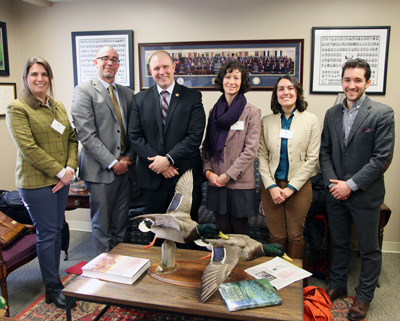
The 2019 General Assembly Session has concluded. The budget and surviving legislation is now with the Governor awaiting action. It was a fast-paced short session — roughly 45 days in which thousands of bills were heard, including the budget bill.
The budget had a couple of bright points. But legislators were clearly focused on tax conformity and teacher salaries, leaving little for the programs we rely on for land conservation. On the legislative front, we listened to old hits including pitches for the Route 29 eastern bypass study and unrestricted events defined as agritourism. There was also an important discussion surrounding proffers. But unfortunately, the legislature was unwilling to address fundamental flaws resulting from the proffer bill from 2016, largely pushed by developer interests.
The next session will bring the Governor’s first full budget, as well as every legislative seat will be up for re-election in November. This means we have an opportunity to make real progress on multiple fronts. But if we are to see improvements in policy and funding levels for the 2020 session, we need each and every one of you to weigh in with your legislators and candidates on behalf of conservation and restoration, local land use authority and environmental protection over the next year.
Below is a summary on the individual bills and budget matters we tracked and worked for this past session.
Budget
Unfortunately, we did not get needed increases for important conservation funding. There were no additions to the land conservation grant programs (Office of Farmland Preservation, Virginia Battlefield Fund and Virginia Land Conservation Foundation), which should be receiving a combined $20 million per year. Important conservation easement staffing positions with the Department of Forestry were left unfunded in light of staff currently turning down projects as they cannot keep up with demand for the program. We did see increased funding for Agriculture Best Management Practices (Ag BMPs), bringing the total to $89.7 million, and an additional $10 million for the Stormwater Local Assistance Fund to reduce pollution associated with agriculture and stormwater runoff. A few other important measures included:
- Restoration of the statutory formula for transferring funds to the Open Space Land Preservation Trust Fund, providing greater assistance to landowners pursuing conservation easements.
- The addition of a 281-acre parcel (which would be added to the 600-acres already owned by the state) for Sweet Run State Park in Loudoun.
- Increased Wildlife Management and Habitat Improvement funding for the Department of Game and Inland Fisheries.
Legislation
Land Use and Transportation
In at least one way, this session was no different from last year with the inclusion of a study for the eastern bypass of Route 29. While the legislation (SJ259, Peake) failed in Senate Finance, the measure continued to be discussed in the budget and as an offered amendment to other legislation (I-81). The legislature listened to many of you that acted on the matter, as the measure failed to progress in any form.
Proffers and impact fee legislation was settled early leading to the passage of “proffer reform” legislation, SB1373 (Favola) and HB2342 (Thomas), from their respective houses. We opposed the bills as they failed to address fundamental flaws with the changes enacted in 2016. While we were unable to convince the legislators of our concerns, we were able to secure a future conversation (through SB 944) on impact fees and alternative tools to cover the costs of growth by the Virginia Housing Commission. While not ideal, it may offer an opportunity to point out the failings of the proffer discussion this year.
Lastly, there was HB 2364 (Knight), which after an amendment, would have added weddings to the list of agritourism activities that local governments are prohibited from regulating. I am pleased to report the bill failed to pass the House floor on a vote of 60-37.
Land Conservation
While the budget news on land conservation was disappointing, we had some good news on the legislative front. Earlier in session, we let you know about SB 1340, a bill to reduce the threshold for which a conservation easement would be subject to an additional review by the Department of Conservation and Recreation. This change would have created an unnecessary barrier to conserving land, making the process more time consuming and costly. This legislation was defeated once it crossed over from the Senate.
Another bill we supported from Delegate Fariss is on the way to the Governor’s desk — HB 1816 (extends the time in which one can claim land preservation tax credits). But another of his bills, HB 2755 (bringing consistency to the Conservation Easement Act and Open Space Lands Act as it relates to conformance with Comprehensive Plans) hit a snag late in the game and was left in the House, failing to progress.

Energy
Most of the good energy bills met their demise in the Committees on Commerce and Labor of the House and Senate. But unlike in past years, some of the votes were closer and some of the bills went farther, potentially signaling a change in the way legislators are viewing these issues.
The Solar Freedom bills, SB1456 (McClellan) and HB 2329 (Keam), would have removed a series of barriers to small scale solar generation. Unfortunately, the legislation was defeated, though HB 2329 got a close 7-8 vote.
HB1718 (Ware), a bill related to cost recovery for natural gas pipelines successfully passed House Commerce and Labor Committee and then went on to pass the full House. Senate Commerce and Labor chose to pass the bill by indefinitely, ending the conversation for this year. While we are upset that the Senate chose Dominion over the ratepayers of Virginia, we have to acknowledge the bill passing the House is a major accomplishment.
Water
Besides the successful inclusion of additional funding for Ag BMPs, we also wanted to alert you of some more good news on Coal Ash clean up. As many may have read in late January, there is growing bipartisan support for the issue, and an agreement was reached. SB 1355 and HB 2786, the two main legislative vehicles, have passed both chambers and are on their way to the Governor’s desk for his signature. Many thanks to everyone who got involved and became a part of the solution!
Conclusion
The Governor has until March 26, 2019 to act (sign, veto or amend), so we have some time before any final accounting. But we anticipate most of the identified funding and legislation will remain unchanged. Looking toward the future, I am cautiously optimistic. Over the next year, it is important to stay engaged and rally the troops to speak with legislators and incoming candidates.
So when the next session comes, we will be able to make progress on the topics discussed in this article.
As always, thank you for any action you took this session to improve the Commonwealth. Please feel free to follow up with me directly at dholmes@pecva.org or 540-347-2334 ext. 7040, if you have questions on any of the bills or the final budget numbers.
This article was featured in our Spring 2019 member newsletter, The Piedmont View.
